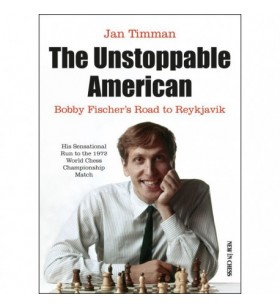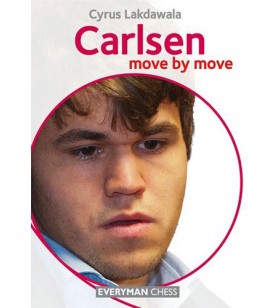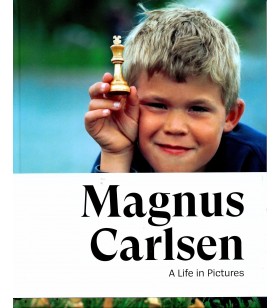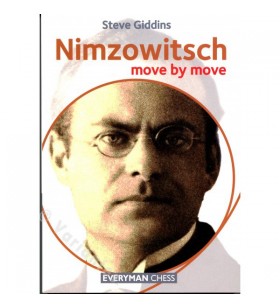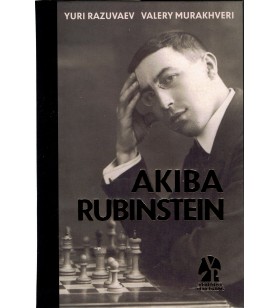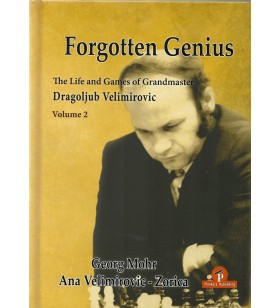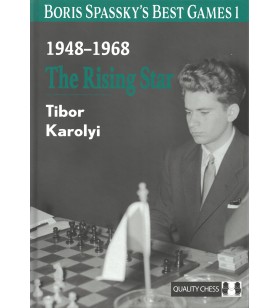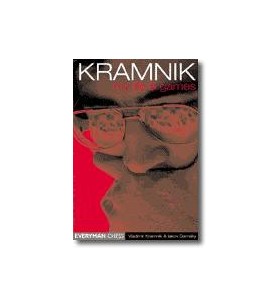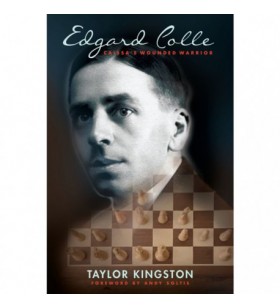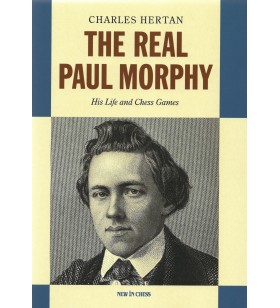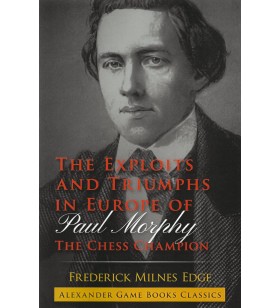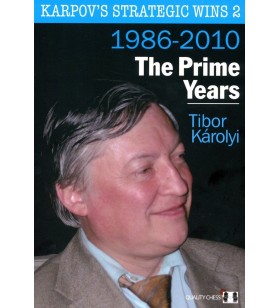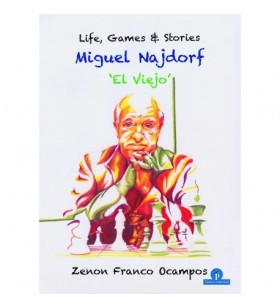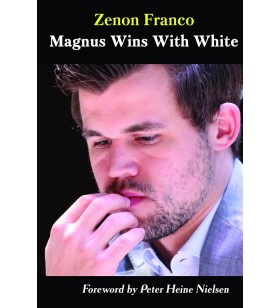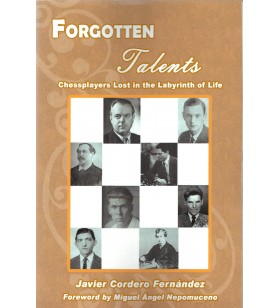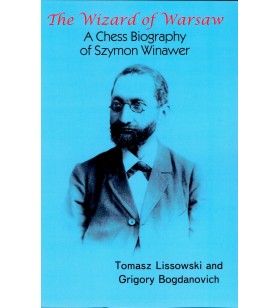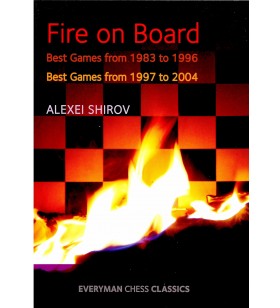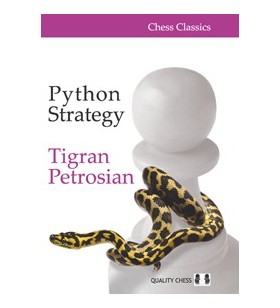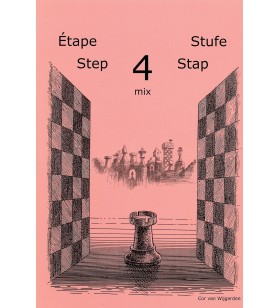- CHESS
- Chess boards and pieces
- Chess books
- Chess books in English and others
- Opening books
- The Ruy Lopez
- Other open games
- Other semi-open games
- The Sicilian
- French Defence
- Pirc & Modern Defence
- Caro-Kann
- Queen´s Gambit
- Slav Defence & Semi-Slav
- Other closed games
- Other semi-closed games
- King´s Indian Defence
- Nimzo & Queen´s Indian
- Grünfeld
- English Opening
- Dutch Defence
- Miscellaneous openings
- General and repertoire books
- Endgame books
- Books on grandmasters
- Books on tournaments
- Books in Dutch
- Miscellaneous
- Chess magazines
- General and middle game books
- Opening books
- Chess books in French language
- Chess books in English and others
- Chess software and DVDs
- Chess computers
- Equipment for clubs
- BOARD & BRAIN GAMES
- GO
- BRIDGE & CARDS & TAROT
- POKER & CASINO GAMES
- PUZZLES & BRAIN TEASERS
- DARTS
KASPAROV - My Great Predecessors part II
Le voilà donc, ce deuxième tome tant attendu - et juste à temps pour Noël. On y (re)découvre les carrières et les parties de Max Euxe, Mikhail Botvinnik, Vassily Smyslov et Mikhail Tal, avec des exposés plus brefs sur quelques-uns de leurs principaux challengers (Keres, Bronstein, Geller). Comme on pouvait l'espérer, on retrouve ici un Kasparov plus impliqué, tant dans l'historique (puisqu'il s'agit de joueurs qu'il a pu connaître, et pour certains affronter) que dans les analyses. Inutile d'en dire beaucoup plus : c'est de la belle ouvrage, en dépit des quelques défauts inhérents à la formule (parties souvent très connues et parti-pris simplificateur sur le plan historique - 100 pages sur Euwe, mais rien sur Reshevsky, Fine, Boleslavsky ou Najdorf...). On attend en tous cas avec impatience le troisième tome - mais patience, aucune date n'est encore annoncée.
 Livraison sous 48 heures via Bpost*
Livraison sous 48 heures via Bpost*
Livraison gratuite à partir de €69 (Belgique, France, Pays-Bas, Luxembourg, Allemagne)
 You can cancel your order
You can cancel your order
For fourteen days!
 Secure payments
Secure payments
All payment cards accepted.
Le voilà donc, ce deuxième tome tant attendu - et juste à temps pour Noël. On y (re)découvre les carrières et les parties de Max Euxe, Mikhail Botvinnik, Vassily Smyslov et Mikhail Tal, avec des exposés plus brefs sur quelques-uns de leurs principaux challengers (Keres, Bronstein, Geller). Comme on pouvait l'espérer, on retrouve ici un Kasparov plus impliqué, tant dans l'historique (puisqu'il s'agit de joueurs qu'il a pu connaître, et pour certains affronter) que dans les analyses. Inutile d'en dire beaucoup plus : c'est de la belle ouvrage, en dépit des quelques défauts inhérents à la formule (parties souvent très connues et parti-pris simplificateur sur le plan historique - 100 pages sur Euwe, mais rien sur Reshevsky, Fine, Boleslavsky ou Najdorf...). On attend en tous cas avec impatience le troisième tome - mais patience, aucune date n'est encore annoncée.
Specific References
16 other product
Razuvaev/Murakhveri - Akiba Rubinstein
OUT OF STOCK
Akiba Rubinstein is universally considered one of the strongest chess players who never won the world crown. From a modest upbringing in the Polish city of Lódz, he rose to become the principal challenger to the world champion Emanuel Lasker in the years leading up to the First World War. Although their world title match failed to take place, mainly due to the outbreak of wartime hostilities, Rubinstein's legacy has remained equal to that of any world champion.
His best games are conspicuous for their power and clarity and reveal his deep positional comprehension, brilliant combinational abilities, and virtuosic endgame technique. Rubinstein also pioneered many innovative and pragmatic ideas in all phases of the game that continue to influence the theory and praxis of modern chess.
Initially published in Russian, Akiba Rubinstein by Yuri Razuvaev and Valery Murakhveri is widely acclaimed as one of the most outstanding chess books of the latter part of the twentieth century. This work comes up repeatedly when today's top chess players name books that have significantly influenced their understanding of the game.
After an in-depth biographical chapter, most of the book consists of detailed annotations to more than 60 of Rubinstein's finest games against players like Alekhine, Bogolyubov, Capablanca, Euwe, Lasker, Marshall, Nimzowitsch, Schlechter, Spielmann, Tarrasch, Tartakower, and other prominent masters. Grandmaster Razuvaev's copious notes to the games are distinguished by his clear and insightful explanations that are revelatory and highly instructive to keen players of all abilities. 571 pages Hardcover
Mohr/Velimirovic/Zorica - Forgotten Genius (The life and Games of Grandmaster Dragoljub Velimirovic) Volume 2
I sincerely hope that you, dear readers, will enjoy the wonderful masterpieces you will find in this book. In addition to the authors, some of Drasko’s contemporaries were also involved in the writing, and they immediately responded with pride and love to the request to keep the memory of the Serbian genius alive. I would like to thank all those who participated in this project.
To the Grandmasters who wrote down their own memories of Drasko Velimirovic, which you will find in this book in special ”boxes”. To the contemporaries, friends, and comrades-in-arms of ”Boss” who remember this or that anecdote, this or that event, this or that memory.
This second volume covers Drasko’s life and chess from 1976 until 2011.
Karolyi - Boris Spassky's best game 1 (1948-1968) The Rising Star
Boris Spassky is the most underappreciated World Champion in chess history, remembered as the Soviet who lost to Bobby Fischer in 1972. In this two-volume work, biographer extraordinaire Tibor Karolyi puts the focus on Spassky’s brilliant career and life story.
Born in 1937, Spassky barely escaped with his life when evacuating from the Siege of Leningrad as a young boy. This book tells the story of how that boy subsequently learned to play chess and rose through the Soviet ranks to become the strongest player in the world in the late 1960s.
International Master Tibor Karolyi is a renowned author and trainer from Hungary. His biographical works for Quality Chess have received glowing praise from readers and reviewers.
Edge - The exploits and triumphs in Europe of Paul Morphy the chess champion
OUT OF STOCK
After having conquered chess America, Paul Morphy issued a challenge to European chess players and traveled there to play the best players of the game, and in particular wanting to face Howard Staunton, the English master who was widely considered to be the best player in the world.
The present book, written by his private secretary, Frederick Milnes Edge, includes accounts and letters of the efforts of Morphy and his supporters to have him face the best players. As you will read, not all of the efforts succeeded.
In the second part of the book, we include a shorter book by C. A. Buck, Paul Morphy - His Later Life, which covers Morphy's life after returning to the US and giving up chess. 173 pages
Fernandez - Forgotten Talents (chessplayers lost in the labyrinth of life)
Throughout the history of chess, elite players have been studied, celebrated and adored. But there also been players, while perhaps not regarded as world-class competitors, who had a precious gift, but who did not know (or could not find) the way to success. They were lost in the labyrinth of difficulties that life always places before every human being.
In the end, for various reasons, history forgot this select group of masters. For some, their careers were very bright (as in the cases of von Kolisch, Neumann and Charousek) but also extremely short, limiting their renown and depriving them of deserved laurels. For others, chess turned out to be excessively demanding for which their minds were unprepared. Finally, for a truly unfortunate few, tragedy – always an unwelcome guest – took over their lives and then took life itself from them.
An exceptionally researched historical work, these pages contain the stories of 23 players with a very unique way of understanding chess (sometimes ahead of their time) and who prioritized the artistic side of the game over the results: an approach that was not properly appreciated in their time.
Now, for the first time, Spanish author and chess historian Javier Cordero puts these Forgotten Talents in the limelight. Archival photos and almost 200 selected games nicely supplement the biographies of these star-crossed players who became Lost in the Labyrinth of Life. 288 pages
Lissowski/Bogdanovich - The wizard of warsaw ( A chess viography of Szymon Winawer)
zymon Winawer was a world top-10 player in the 1870s and 1880s, dueling with such titans as Steinitz, Lasker, Anderssen, Marshall, Chigorin, Zukertort, Louis Paulsen, Janowski, Maroczy, Tarrasch and others, and defeating most of the leading players of his time. He won or took prizes in major international tournaments, including Paris 1867 (second, behind Kolisch and above Steinitz), Leipzig 1877 (fourth, behind Paulsen, Anderssen and Zukertort), Paris 1878 (first equal with Zukertort, though he lost the play-off), Berlin 1881 (third equal with Chigorin, behind Blackburne and Zukertort), Vienna 1882 (first equal with Steinitz), and Nuremberg 1883 (first, ahead of Blackburne).
Winawer was a proponent of fighting chess, regularly deploying the King’s Gambit and Ruy Lopez as white, demonstrating winning combinations as well as positional sacrifices and endgame precision. He attacked the castled king with his h-pawn 150 years before Alpha-Zero. He displayed technique using Horowitz bishops and opening the g-file. At the same time, we see in the book that he also played solid positional chess. Moreover, several opening ideas are named after him, including the popular Winawer Variation of the French Defense.
The Warsaw-born player was not a chess professional and never published any annotated games of his own, but some of his concepts, both in the opening and in the middlegame, are still valid in the 21st century. Indeed, many strategic ideas (blockade, exploiting doubled pawns, maneuvering) described in the works of Nimzowitsch and other hypermodernists can be found, in embryonic form, in the games of Winawer played half a century earlier.
In the first half of this biographical work, Warsaw-based chess historian Tomasz Lissowski, who has co-written books on Kieseritzky and Zukertort among others, portrays Winawer’s life and his sporting achievements in the context of the epoch. This book delivers not only a description of the evolution of chess in Poland in the nineteenth century, but a sense through the prism of chess of the political and social history of Poland and the Austro-Hungarian, German and Russian empires in a period of war and upheaval. It is illustrated by many historical photos from the period.
In the second half of this book, International Master Grigory Bogdanovich paints Winawer’s creative portrait, as well as examining the legacy that this ingenious improviser left to chess culture. The book contains in total 132 annotated instructive games and fragments of Winawer and his contemporaries. 301 pages
Customers who bought this product also bought:
KASPAROV - My Great Predecessors part V
Cinquième tome de la somme kasparovienne sur les grands joueurs de l'histoire - histoire toute récente ici, puisque les protagonistes sont Korchnoi et Karpov (on reviendra naturellement sur Anatoly dans le volume consacré à ses duels contre Kasparov). Toujours les mêmes qualités, toujours les mêmes défauts, et sans doute toujours le même succès - inutile de faire l'article. Mais n'oublions pas de relire aussi ce que les deux K ont écrit eux-mêmes...
KASPAROV - My Great Predecessors part IV
D'après l'éditeur, voici le tome le plus attendu de la série... C'est bien probable - et c'est bien étrange, car c'est sans doute celui dont on a le moins à attendre. Que raconter de neuf sur le seul champion du monde américain? Nulle carrière n'a été davantage scrutée, peu de parties autant analysées - par Fischer lui-même dans Mes soixante meilleures parties pour celles du début, par le monde des échecs tout entier pour celles de la fin, et par tout auteur à court d'inspiration depuis. Mais un instant - je suis en train de commettre la même erreur que tous ceux qui ont suivi aveuglément une couverture et une publicité tapageuse et réductrice. Car ce tome quatrième n'est pas consacré seulement au sale gosse de Brooklyn. Pour étoffer l'ensemble, les auteurs ont en effet adjoint aux 250 pages consacrées à celui-ci une première partie de presque égale importance portant sur les autres grands champions occidentaux de la période post-Alekhine. Ce qui entraîne au demeurant un curieux téléscopage chronologique, puisqu'on retrouve en particulier Reuben Fine, dont la carrière se termina sensiblement avant que Fischer (et Larsen, lui aussi largement présent) ne commencent la leur. En dehors des deux précités, on retrouvera aussi deux occidentaux accidentels, si on me pardonne cette image plaisante : Miguel (né Moishe) Najdorf et Samuel Reshevsky, qui eurent la mauvaise idée de naître juifs dans la Pologne du début du siècle, et la bonne de la quitter à temps (et même juste à temps pour le futur argentin, qui fit partie de ceux - Eliskases, Pilnik, Pelikan... - qui purent remercier la FIDE d'avoir programmé une Olympiade à Buenos Aires en août-septembre 1939). Après cette première partie forcément intéressante - on ne dispose que de peu, voire de pas du tout de littérature sur tous ces joueurs - vient la portion Fischer. Après une introduction stupéfiante certainement signée Kasparov, qui nous renseigne beaucoup plus sur Kasparov lui-même que sur le sujet théorique, vient un long développement détaillant la trajectoire chaotique du champion américain. Comme toujours, on retrouve l'alternance d'une biographie solide mais sans surprise (et qui ne doit sans doute rien, elle, à l'homme de Bakou) et de parties aux commentaires eux aussi solides, et eux aussi dépourvus de grandes surprises (cf début du texte...).
MULLER, LAMPRECHT - Fundamental Chess Endings
KASPAROV - My Great Predecessors part III
La taille a diminué d'un quart, mais le prix est hélas resté le même... Ce troisième tome est l'occasion de redécouvrir les deux joueurs sans doute les plus sous-estimés de l'histoire des échecs. Parce qu'il ont eu le malheur de régner quand le monde des échecs n'avait d'yeux que pour le ludion Fischer, et parce que leur style était pour l'un difficile à comprendre et pour l'autre difficile à caractériser, Petrosian et Spassky ont parfois été considérés comme des champions au rabais. Leur palmarès et leur valeur méritent pourtant mieux que ce jugement hâtif, et ce volume devrait contribuer à remettre quelque peu les pendules à l'heure - quelque peu seulement, la sélection de parties étant un peu courte pour illustrer d'aussi longues carrières (souvenons-nous que Petrosian fut présent dans les Tournois des Candidats durant 27 ans...). Au passage, on retrouve aussi quelques comparses doués : Portisch, le malchanceux Leonid Stein et, plus étrangement (car ses meilleurs résultats datent de l'ère Karpov), Lev Polougaevsky. Quand au style du livre, inutile d'y revenir : vous commencez à connaître le produit. Rendez-vous sous peu pour un sujet beaucoup plus rebattu : Bobby Fischer...
KASPAROV - My Great Predecessors part I
Deux des plus forts joueurs de notre temps (je veux dire Kasparov et Fritz, puisque l'ex-champion du monde ne fait pas mystère d'utiliser abondamment l'aide de l'informatique) se penchent sur les accomplissements des champions du passé. Ce premier volume passe en revue un bon siècle de l'histoire du jeu, du premier championnat du monde officieux (McDonnell-La Bourdonnais 1834) à la mort d'Alekhine (1946), sautant bizarrement la parenthèse Euwe (1935-37) gardée pour le deuxième tome. Comme son titre et sa couverture l'indiquent, l'ouvrage se focalise sur les quatre champions du monde officiels, mais les auteurs prennent le temps de nous parler un peu de leurs principaux adversaires, avec tout de même quelques négligences regrettables (Maroczy représenté simplement par une fin de partie perdue...). Par la force des choses, les parties présentées (117, plus une trentaine d'extraits) sont en général archiconnues, mais elles ont bénéficié d'un travail d'annotation fouillé, utilisant tant l'oeuvre des commentateurs passés que les ressources de la technique moderne, esquissant ainsi une sorte de mise en perspective de l'histoire des échecs. Osons tout de même deux petites critiques (ce qui fera donc trois au total) à l'encontre de ce bel ouvrage : la mise en page un peu négligente, qui rend la lecture de certaines parties un peu laborieuse, et la présence d'une introduction superflue où Kasparov se répand en considérations politico-historiques passablement filandreuses - tout homme, quelle que soit son intelligence, devrait se cantonner à sa spécialité... Un dernier détail : comme le livre s'achève inévitablement par un rappel (honnête mais un peu édulcoré) des agissements d'Alekhine durant la Seconde Guerre Mondiale, signalons que l'historien Ken Whyld vient de rééditer une plaquette contenant les articles antisémites écrits pour le Pariser Zeitung, accompagnés d'une introduction faisant le point sur l'affaire (Alekhine Nazi Articles).

 Français
Français Nederlands
Nederlands English
English
